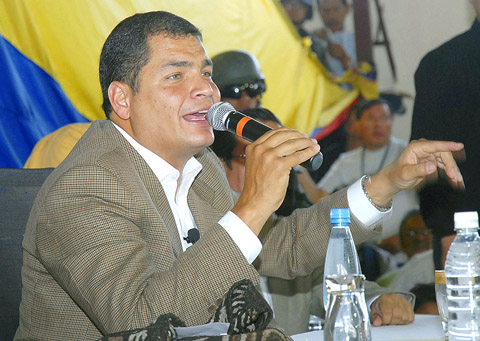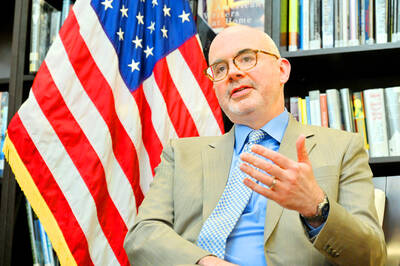Ecuadorian President Rafael Correa said on Saturday he has “no confidence” in the World Bank arbitration branch that is hearing US oil company Occidental’s lawsuit against Ecuador.
Ecuador “handed over its sovereignty” when it signed international accords binding it to the bank’s International Center for Settlement of Investment Disputes (ICSID), Correa said during his weekly radio address.
The ICSID is an autonomous court established to resolve investment disputes.

PHOTO: AP
Los Angeles-based Occidental Petroleum Corp is seeking US$1 billion in damages from Ecuador, alleging its property was confiscated illegally when the Andean nation canceled its operating contract in May 2006.
Occidental, whose production represented about 20 percent of Ecuador’s total output, also is seeking to recover the oil fields.
Ecuador accuses the company of illegally selling 40 percent of its concession to EnCana Corp of Canada without Energy Ministry authorization.
Correa withdrew Ecuador from the Washington-based court in December, but the country is still on the hook for cases pending at the time — including Occidental’s claim.
In a separate case before the court, Ecuador recently reached a settlement with Occidental to return US$100 million in taxes. The company had originally said it was due a US$171 million refund, and Ecuador’s energy minister called the agreement a victory.
On Saturday, Correa assured Ecuadorians that the country will win its pending dispute with Occidental at the court.
He also praised a recent decision by the tribunal to grant Ecuador an extra month to prepare its defense, until June 16.
But still, he said accords giving the court authority over foreign investment disputes are “just another one of the things that Latin America has to change.”
Correa and other critics accuse the court of being beholden to US interests. Bolivian President Evo Morales, a close ally, announced plans to withdraw from the center last year.
Correa suggested that Latin American governments ban all “extra-regional” arbitration to leave space for organizations like the Inter-American Development Bank (IADB) to operate.
He called the IADB — which has extended some US$3 billion in long-term credit to Ecuador for social programs — an “important collaborator.”
Correa took office last January promising to force foreign oil companies to share more of the oil they produce with the state and to cut ties with the World Bank and IMF.
Four months later he kicked the World Bank’s local representative out of the country.

NATIONAL SECURITY: The Chinese influencer shared multiple videos on social media in which she claimed Taiwan is a part of China and supported its annexation Freedom of speech does not allow comments by Chinese residents in Taiwan that compromise national security or social stability, the nation’s top officials said yesterday, after the National Immigration Agency (NIA) revoked the residency permit of a Chinese influencer who published videos advocating China annexing Taiwan by force. Taiwan welcomes all foreigners to settle here and make families so long as they “love the land and people of Taiwan,” Premier Cho Jung-tai (卓榮泰) told lawmakers during a plenary session at the Legislative Yuan in Taipei. The public power of the government must be asserted when necessary and the Ministry of

CROSSED A LINE: While entertainers working in China have made pro-China statements before, this time it seriously affected the nation’s security and interests, a source said The Mainland Affairs Council (MAC) late on Saturday night condemned the comments of Taiwanese entertainers who reposted Chinese statements denigrating Taiwan’s sovereignty. The nation’s cross-strait affairs authority issued the statement after several Taiwanese entertainers, including Patty Hou (侯佩岑), Ouyang Nana (歐陽娜娜) and Michelle Chen (陳妍希), on Friday and Saturday shared on their respective Sina Weibo (微博) accounts a post by state broadcaster China Central Television. The post showed an image of a map of Taiwan along with the five stars of the Chinese flag, and the message: “Taiwan is never a country. It never was and never will be.” The post followed remarks

Proposed amendments would forbid the use of all personal electronic devices during school hours in high schools and below, starting from the next school year in August, the Ministry of Education said on Monday. The Regulations on the Use of Mobile Devices at Educational Facilities up to High Schools (高級中等以下學校校園行動載具使用原則) state that mobile devices — defined as mobile phones, laptops, tablets, smartwatches or other wearables — should be turned off at school. The changes would stipulate that use of such devices during class is forbidden, and the devices should be handed to a teacher or the school for safekeeping. The amendments also say

CONSISTENT COMMITMENT: The American Institute in Taiwan director said that the US would expand investment and trade relationships to make both nations more prosperous The US would not abandon its commitment to Taiwan, and would make Taiwan safer, stronger and more prosperous, American Institute in Taiwan Director Raymond Greene said. “The US’ commitment to Taiwan has been consistent over many administrations and over many years, and we will not abandon our commitment to Taiwan, including our opposition to any attempt to use force or coercion to change Taiwan’s status,” he said in an exclusive interview with the Liberty Times (the sister newspaper of the Taipei Times) on Friday last week, which was published in the Chinese-language newspaper yesterday. The US would double down on its efforts